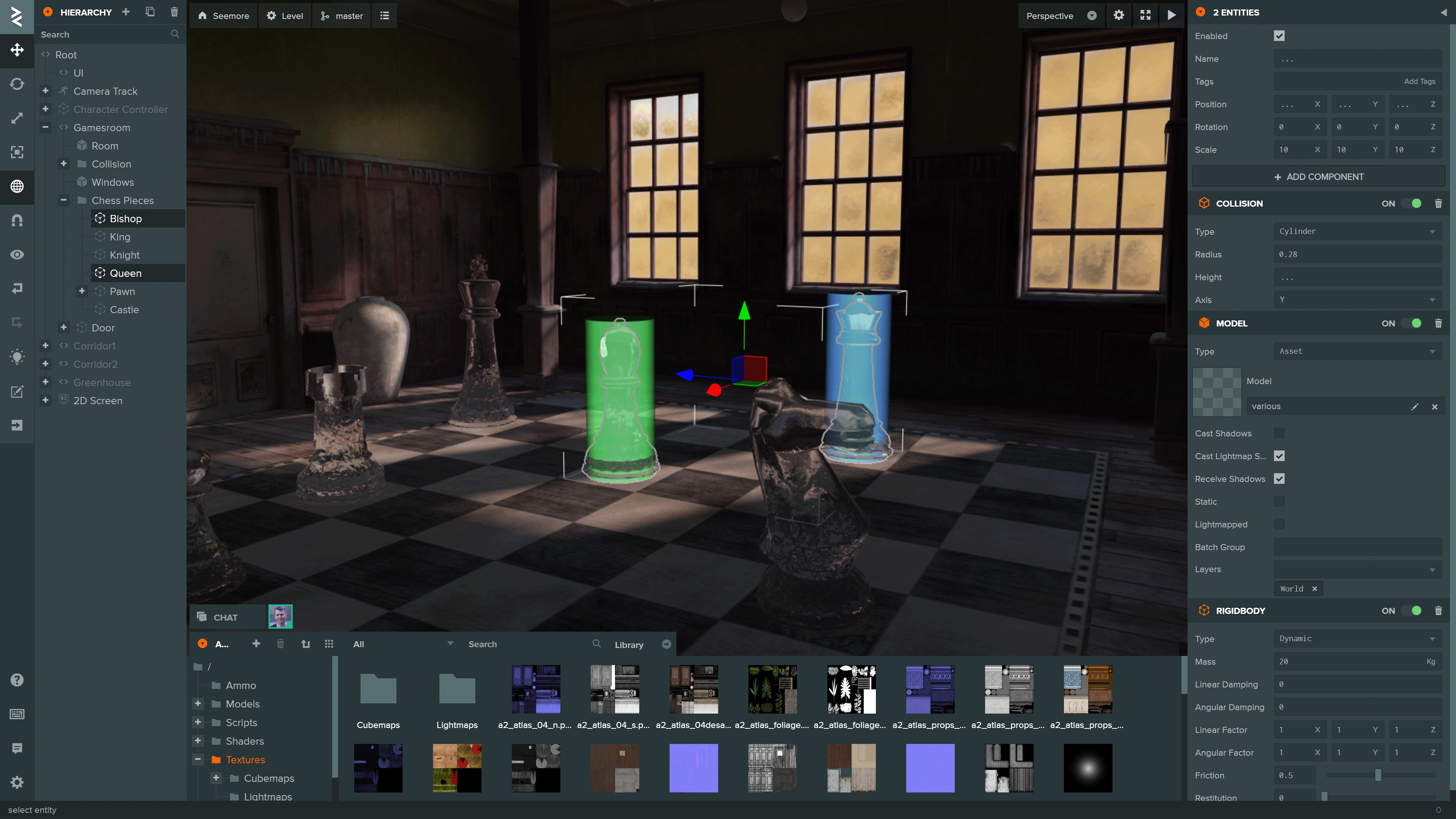playcanvas-physics-advanced v1.68.9
Playcanvas Physics Advanced
This is an advanced physics version of the original PlayCanvas game engine.
On npm: playcanvas-physics-advanced. Install with:
npm install playcanvas-physics-advancedFeatures added/changed from original PlayCanvas:
'physics'component used instead of'rigidbody'component.'multibody'component added to allow multibody articulations for much greater stability of many-jointed bodies.'joint'component changed significantly from official playcanvas joint componentEventHandlercan use any key for events, not only strings; also symbols and numbers.Quat.distance()measures rotational distance between two quaternions.
PlayCanvas WebGL Game Engine
Docs | Examples | Forum | Blog
PlayCanvas is an open-source game engine. It uses HTML5 and WebGL to run games and other interactive 3D content in any mobile or desktop browser.
Users
PlayCanvas is used by leading companies in video games, advertising and visualization such as:
Animech, Arm, BMW, Disney, Facebook, Famobi, Funday Factory, IGT, King, Miniclip, Leapfrog, Mojiworks, Mozilla, Nickelodeon, Nordeus, NOWWA, PikPok, PlaySide Studios, Polaris, Product Madness, Samsung, Snap, Spry Fox, Zeptolab, Zynga
Features
PlayCanvas is a fully featured game engine.
- 🧊 Graphics - Advanced 2D + 3D graphics engine built on WebGL 1 & 2.
- 🏃 Animation - Powerful state-based animations for characters and arbitrary scene properties
- ⚛️ Physics - Full integration with 3D rigid-body physics engine ammo.js
- 🎮 Input - Mouse, keyboard, touch, gamepad and VR controller APIs
- 🔊 Sound - 3D positional sounds built on the Web Audio API
- 📦 Assets - Asynchronous streaming system built on glTF 2.0, Draco and Basis compression
- 📜 Scripts - Write game behaviors in Typescript or JavaScript
Usage
Here's a super-simple Hello World example - a spinning cube!
<!DOCTYPE html>
<html>
<head>
<meta charset="utf-8">
<title>PlayCanvas Hello Cube</title>
<meta name='viewport' content='width=device-width, initial-scale=1, maximum-scale=1, minimum-scale=1, user-scalable=no' />
<style>
body {
margin: 0;
overflow: hidden;
}
</style>
<script src='https://code.playcanvas.com/playcanvas-stable.min.js'></script>
</head>
<body>
<canvas id='application'></canvas>
<script>
// create a PlayCanvas application
const canvas = document.getElementById('application');
const app = new pc.Application(canvas);
// fill the available space at full resolution
app.setCanvasFillMode(pc.FILLMODE_FILL_WINDOW);
app.setCanvasResolution(pc.RESOLUTION_AUTO);
// ensure canvas is resized when window changes size
window.addEventListener('resize', () => app.resizeCanvas());
// create box entity
const box = new pc.Entity('cube');
box.addComponent('model', {
type: 'box'
});
app.root.addChild(box);
// create camera entity
const camera = new pc.Entity('camera');
camera.addComponent('camera', {
clearColor: new pc.Color(0.1, 0.1, 0.1)
});
app.root.addChild(camera);
camera.setPosition(0, 0, 3);
// create directional light entity
const light = new pc.Entity('light');
light.addComponent('light');
app.root.addChild(light);
light.setEulerAngles(45, 0, 0);
// rotate the box according to the delta time since the last frame
app.on('update', dt => box.rotate(10 * dt, 20 * dt, 30 * dt));
app.start();
</script>
</body>
</html>Want to play with the code yourself? Edit it on CodePen.
How to build
Ensure you have Node.js installed. Then, install all of the required Node.js dependencies:
npm installNow you can run various build options:
| Command | Description | Outputs |
|---|---|---|
npm run build | Build release, min, debug and profiler engines | build\playcanvas[.min/.dbg/.prf].[mjs/js] |
npm run build:es5 | Build release, min, debug and profiler engines for es5 only | build\playcanvas[.min/.dbg/.prf].js |
npm run build:release | Build release engine for es5 and es6 | build\playcanvas.[mjs/js] |
npm run build:types | Build engine Typescript bindings | build\playcanvas.d.ts |
npm run docs | Build engine API reference docs | docs |
Pre-built versions of the engine are also available.
Latest development release (head revision of dev branch):
- https://code.playcanvas.com/playcanvas-latest.js
- https://code.playcanvas.com/playcanvas-latest.min.js
Latest stable release:
- https://code.playcanvas.com/playcanvas-stable.js
- https://code.playcanvas.com/playcanvas-stable.min.js
Specific engine versions:
- https://code.playcanvas.com/playcanvas-1.38.4.js
- https://code.playcanvas.com/playcanvas-1.38.4.min.js
Generate Source Maps
To build the source map to allow for easier engine debugging, you can add -- -m to any engine build command. For example:
npm run build -- -mThis will output to build/playcanvas.js.map
PlayCanvas Editor
The PlayCanvas Engine is an open source engine which you can use to create HTML5 apps/games. In addition to the engine, we also make the PlayCanvas Editor:
For Editor related bugs and issues, please refer to the Editor's repo.





